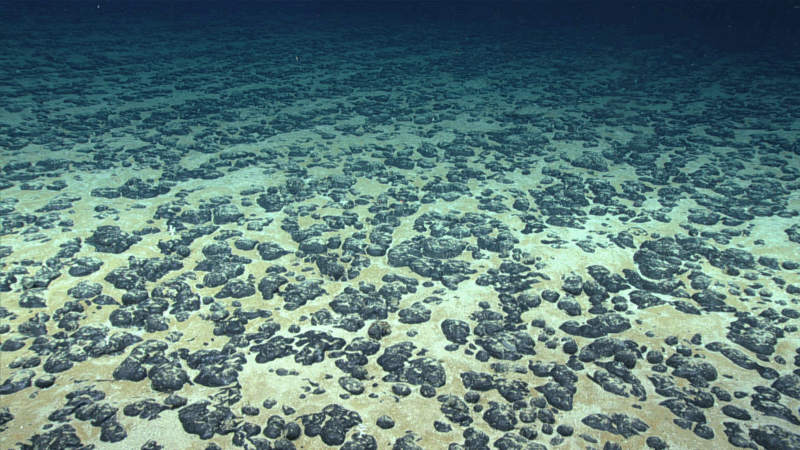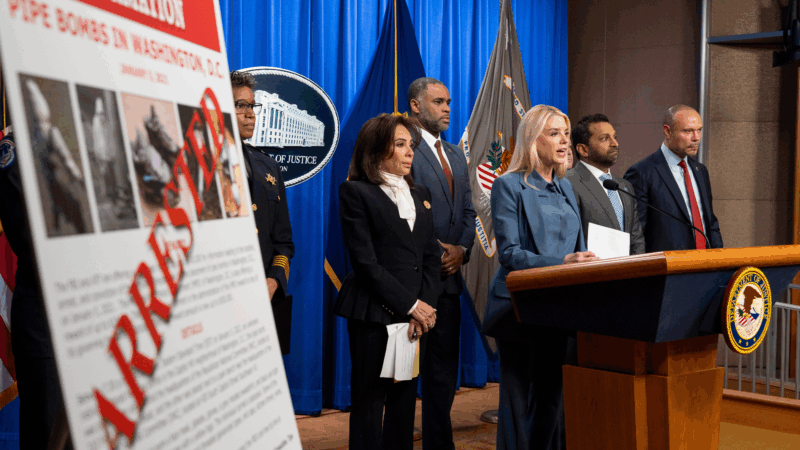The U.S. takes a step towards allowing mining on the ocean floor, a fragile ecosystem
President Trump signed an executive order Thursday aimed at making it easier for companies to mine the deep seafloor, saying it would create “a robust domestic supply for critical minerals.”
There is currently no commercial-scale deep-sea mining anywhere in the world. But companies have long eyed the ocean floor as a potential source of metals like nickel, cobalt, manganese and copper, which are used in batteries for electric vehicles and other technologies.
These metals can be found in potato-sized nodules lying on the ocean floor. Many of the nodules are in the middle of the Pacific ocean, beyond the legal territory of individual countries.
Thursday’s order might circumvent ongoing international negotiations to regulate deep-sea mining.
Those regions have traditionally been overseen by an international organization, the International Seabed Authority (ISA). The ISA has hosted talks for years to try to hammer out a rulebook to govern a potential seabed mining industry. The U.S. did not ratify the treaty that governs the seabed, and is not a voting member of the ISA, though in the past under previous administrations it has respected the ISA process.
In his executive order, Trump instructed federal agencies to expedite the process for reviewing and issuing permits for mining on the seafloor in both U.S. and international territory. It will use a U.S. law from 1980, the “Deep Seabed Hard Mineral Resources Act.”
Scientists and environmental groups condemned the order, arguing that opening the deep seabed for mining could disrupt important marine ecosystems, and damage the fishing industry.
“This is being planned on some of the least resilient ecosystems on the planet,” says Douglas McCauley, professor of ocean science at the University of California Santa Barbara. “It would have catastrophic biological consequences.”
Underwater mining can create plumes of sediment that could suffocate marine life, and degrade the food webs that fish depend on, McCauley says.
There are also important questions about whether we actually need to be mining the seabed to get enough of these minerals for technologies like batteries, says Micah Ziegler, assistant professor of energy and chemical systems at Georgia Institute of Technology.
While a couple of years ago researchers were concerned about the limitations of land-based mining for metals like cobalt and nickel, a variety of alternative battery chemistries have been developed that might reduce the need for those elements, Ziegler says.
“People said we were going to be cobalt-limited and then we found a bunch of alternative chemistries that use less [or no] cobalt,” Ziegler says. “The technologies are changing so rapidly and alternatives are being explored.”
At least one company has expressed interest in applying for a permit to mine the seafloor through the U.S. The Metals Company, a Canadian mining company, said this spring it would seek a permit from the Trump administration. Shares of the company were up 44% by the end of the day Thursday.
Pipe bomb suspect told FBI he targeted U.S. political parties, memo says
The man accused of placing two pipe bombs in Washington on the eve of Jan. 6, 2021 told investigators someone needed to "speak up" for people who believed the 2020 election was stolen, prosecutors said Sunday.
Chinese military stages drills around Taiwan to warn ‘external forces’
The drills came after Beijing expressed anger at U.S. arms sales, and a statement by Japan's prime minister saying its military could get involved if China were to take action against Taiwan.
Trump and Netanyahu to meet in Florida at a crucial moment for the Gaza ceasefire
President Trump could use the face-to-face at his Mar-a-Lago estate to look for ways to speed up the peace process, as Israel's leader has been accused of not pushing his side to move fast enough.
‘Bomb cyclone’ forecasted to bring heavy snow, blizzard conditions and dangerous travel
A 'bomb cyclone' is intensifying severe winter weather for millions of people across the U.S. The system is expected to knock out power and disrupt holiday travel.
Russia sends 3 Iranian satellites into orbit, report says
The report said that a Russian rocket sent the satellites on Sunday from a launchpad in eastern Russia.
Viral global TikToks: A twist on soccer, Tanzania’s Charlie Chaplin, hope in Gaza
TikToks are everywhere (well, except countries like Australia and India, where they've been banned.) We talk to the creators of some of the year's most popular reels from the Global South.








